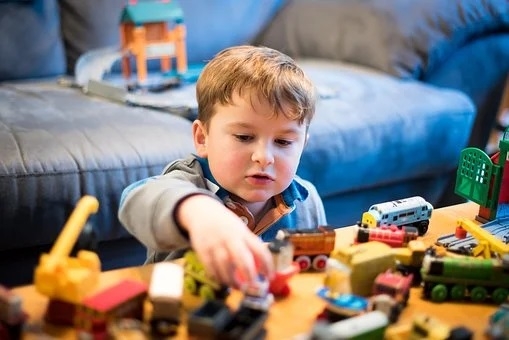Discipling Toddlers the Right and Wrong way!
August 21st, 2020
1383 Views

Did anyone ever say that parenting was easy? If you are the proud parent of a lively toddler you will certainly have a good challenge on your hands! You may well find yourself often glancing at the photograph on the shelf taken when your toddler was younger and asking yourself where has my placid baby gone?
The answer is that your baby is still right there in front of you but they are at the stage where they are discovering everything about anything and in doing so they are pushing the boundaries on discipline as they learn the difference between right and wrong.
The first thing to do is to sit down with your other half one evening, relax with a glass of wine and discuss what house rules you would like, such as no shoes indoors, no toys in the lounge, food only to be eaten in the kitchen etc. Discuss your own childhoods and how strict your parents were and how you felt about various rules – my mum taught me from an early age that ‘a gift was not a gift until I had said thank you for it' and I still hear her words every time I am given a pressie!
You may well find that you do not agree on all aspects of discipline and you may both have to compromise. It is very important that you are a team and in agreement and the key word is ‘consistency’ – don’t we all remember playing one parent off against the other to see who would say ‘yes’!
The answer is that your baby is still right there in front of you but they are at the stage where they are discovering everything about anything and in doing so they are pushing the boundaries on discipline as they learn the difference between right and wrong.
Laying the ground rules.
The good news is that this is a phase in your child’s life and if you handle it well you will have laid strong firm foundations for the future – handle it wrongly and you are in for a rough ride for longer. The number one golden rule is not to smack your child as it sends all the wrong signals, can profoundly affect your child and does not set the right example. The second rule is not to let your life get on a downhill spiral and non-stop negativity. It sounds a tall order but it is possible!The first thing to do is to sit down with your other half one evening, relax with a glass of wine and discuss what house rules you would like, such as no shoes indoors, no toys in the lounge, food only to be eaten in the kitchen etc. Discuss your own childhoods and how strict your parents were and how you felt about various rules – my mum taught me from an early age that ‘a gift was not a gift until I had said thank you for it' and I still hear her words every time I am given a pressie!
You may well find that you do not agree on all aspects of discipline and you may both have to compromise. It is very important that you are a team and in agreement and the key word is ‘consistency’ – don’t we all remember playing one parent off against the other to see who would say ‘yes’!
Your child needs boundaries.
A parent who is lax with discipline is not doing their child any favours. To a child the world seems an enormous place and home is their sanctuary. Within their home, they need a routine and discipline as these give a framework to their days and gives them confidence and security. The best way to teach your child is by example - they will soon understand that you are polite with other people and that you do not throw your newspapers all around the lounge!
Set boundaries and keep them.
Give your child very clear rules that you know that they understand. Explain the reasons why you need the rule (having a rule for your own convenience is not good) for example ‘we always wash our hands before we sit down for a meal. We do this so that our hands are not dirty as this would make us ill’.With the rule in place, you need to explain to your child what happens if they don’t pick up their clothes or pick up their toys - for example, they will not be able to wear their favourite shoes at all tomorrow or if they do not pick all their toys up now, they will be put away for the rest of the day. Be very careful that you are not making the punishment unrealistic or too severe. Anything you say, must be carried through and you must not give in. As the minutes slip by, remind your child what you have said about the consequence of them not doing something. Try and may it fun for example, if they have to tidy up, see if they can beat the egg or cooking timer and be finished before the sand runs out or the bell goes – this puts things on a positive note.

Give your child plenty of attention.
Often children will do something that they know is wrong because they have found it is one way to get your attention! Sad, but true. Do you spend quality time with your toddler each day or do they have to fight your mobile for attention? Do you really listen to what your toddler is trying to tell you? If you have a new baby, does your toddler’s misbehaviour coincide with your baby’s feeding times? The solution for this is to put a positive spin on things and whilst your baby is feeding, ignore your baby and enjoy reading a book with your toddler and give them your attention – you can have special time with your baby when your toddler is asleep.123 and Calling time.
This is a very effective method if used well. If your toddler is doing something that they should not be doing, tell them simply and clearly that if they continue and you have to tell them ‘no’ three times that they will be given ‘time out’. If your toddler still continues to pull the heads off the flowers, remind them what you have already said starting with the phrase - ‘ Liam, this is the second time I am asking you not to pull the flowers off the plant. If you do not stop and I have to tell you a third time, you will have ‘time out’.When the inevitable happens, your response must be cool and calm - ‘Liam this is the third time that I have asked you to stop pulling the flowers off the plant and because you have not stopped you are having ‘time out’. Take your toddler away from the situation and they must stay in your chosen spot for two minutes (approximately one minute per year of age).

Praise good behaviour!
Whenever your toddler does something good tell them how great it is that they have done XYZ – and you will soon find that they are trying to help you in all sorts of ways. Give them a few little jobs they can do to help such as tidying the shoes in the hallway or some dusting.Discussing behaviour.
If you have special events coming up, chat to your toddler about them and why they are special and the type of behaviour that you expect from them – for example how quiet they must keep during the wedding service (always take something really quiet in your bag that can amuse them if needed).Let them learn things for themselves.
Sometimes, it can be more effective to tell a child something a couple of times and then say no more on the subject, as they will soon learn why you were telling them it was not a good idea! A classic example is if your toddler insists on pouring the sand from their sandpit onto the ground – when they have run out of sand in their pit, they will learn very quickly why it was not such a good idea!Sometimes, your toddler will seem like they are looking for trouble as they break one rule after the other. In this situation, keep positive and change the tempo by going for a walk together as it will do you both good...
Chrissie x

